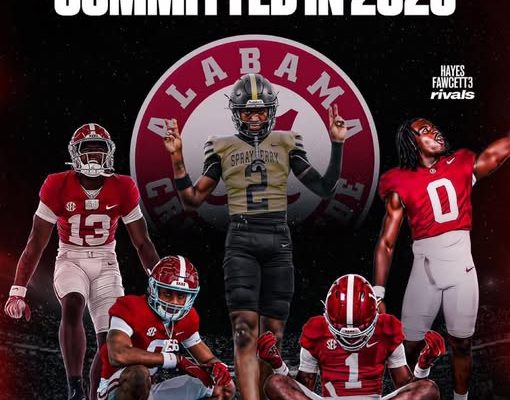Alabama football isn’t just a brand—it’s a machine, and in the 2025 recruiting cycle, it’s flexing every bit of that dominance once again. As of August 1st, the Crimson Tide have surged to No. 3 in the 247Sports composite team rankings, trailing only Georgia and Ohio State. More impressively, they currently sit at the very top of the Rivals rankings, thanks in large part to a jaw-dropping haul of five 5-star commitments—the most of any program in the country. This surge has not only reaffirmed Alabama’s place in the elite tier of college football recruiting, but it also signals the continuation of a new era under head coach Kalen DeBoer, who has wasted no time proving that the Alabama standard isn’t just alive—it might be stronger than ever.
For years, Nick Saban’s presence alone was enough to draw the nation’s top talent to Tuscaloosa. But when he announced his retirement in early 2024, some speculated the program would take a step back, at least on the recruiting trail. That prediction has proven to be dramatically premature. DeBoer has not only maintained Alabama’s national reach, he’s amplified it with a fresh energy, a modernized offensive philosophy, and a relentless staff that is quickly proving it belongs among the best in the nation. At a time when name, image, and likeness (NIL) money is shifting the recruiting landscape, Alabama hasn’t just kept up—it’s led the charge, building competitive NIL opportunities while continuing to sell the development and tradition that have long made it a launching pad to the NFL.
The five 5-star commitments at the center of Alabama’s rise aren’t just paper champions—they are elite talents, each capable of becoming immediate contributors at the next level. Leading the way is quarterback Julian Lewis, a dynamic playmaker from Georgia who flipped from USC earlier this summer. Lewis is the No. 2 quarterback in the nation, a consensus 5-star, and widely regarded as a foundational piece in this class. With a live arm, sharp football IQ, and dual-threat capability, Lewis is exactly the type of quarterback Alabama has been lacking in recent seasons, and his commitment set the tone for what has become a monster recruiting run.
Just behind Lewis in impact is 5-star offensive tackle Micah DeBose from Vigor High School in Prichard, Alabama. A 6-foot-5, 330-pound mauler with elite footwork and balance, DeBose is the kind of offensive lineman who can start early in the SEC. He’s ranked as the No. 2 tackle nationally and has drawn comparisons to former Alabama great Cam Robinson. DeBose’s pledge to stay home rather than explore out-of-state offers from LSU, Florida State, and Texas speaks volumes about Alabama’s ability to lock down its in-state borders, even with national powers circling.
The Crimson Tide also struck gold in the defensive trenches with the commitment of Elijah Griffin, a 6-foot-6, 285-pound defensive lineman out of Savannah, Georgia. Griffin, who’s currently ranked as the No. 1 defensive lineman in the country by Rivals, chose Alabama over Georgia and Clemson in a recruiting battle that had the entire Southeast watching. With his length, burst off the line, and ability to disrupt both run and pass plays, Griffin projects as an early contributor who could anchor the Crimson Tide front seven for years to come. Alabama’s ability to win these kinds of battles—especially against SEC East powers—is a crucial component of its sustained recruiting dominance.
The fourth 5-star in the class is Zion Grady, a relentless edge rusher out of Enterprise, Alabama. Grady has been on Alabama’s radar since his freshman year, and after a long evaluation process, the Tide locked down his commitment earlier this summer. What makes Grady special is his versatility—he can play standing up in a 3-4 look or put his hand in the dirt and explode off the edge. In an era when pass rushing has become paramount to SEC defenses, Grady is the prototype. He’s already being compared to former Alabama greats like Will Anderson Jr. and Tim Williams, and if he follows a similar developmental path, Alabama could once again lead the SEC in sacks.
Rounding out the Tide’s quintet of 5-stars is cornerback Dijon Lee Jr., a California native who committed in what many consider a recruiting upset. Lee, a long and rangy defensive back, was widely expected to stay on the West Coast with either Oregon or USC, but Alabama’s track record with defensive backs—combined with strong relationships built by new defensive backs coach Travaris Robinson—won out. At 6-foot-3 and 190 pounds, Lee fits the mold of the modern SEC cornerback: physical, long, and capable of erasing opposing receivers. His commitment gives Alabama yet another elite option in a secondary that continues to be one of the most consistently well-developed units in the country.
Beyond just the five-star talent, the Crimson Tide’s overall class is shaping up to be one of the deepest in recent memory. Four-star linebacker Brayden Jenkins out of Texas, four-star wideout Koby Howard from Florida, and four-star safety Keon Riley from Mississippi headline a group of blue-chip prospects that fill out every positional need. With more than 20 total commits already, Alabama has managed to combine elite talent with class balance, ensuring that the 2025 group will be remembered not just for its star power, but for its strategic completeness.
What’s perhaps most impressive about Alabama’s 2025 class isn’t just the number of stars next to each name—it’s the way the class was built. The Tide have recruited nationally, pulling players from California, Georgia, Texas, Florida, and their home state. In a modern college football landscape that rewards regional specialization and NIL-fueled poaching, Alabama remains a true national brand. It can walk into any living room in the country and command attention—and more importantly, respect. That’s a credit not only to the program’s championship pedigree, but also to the current coaching staff’s ability to sell a vision of sustained greatness even in a post-Saban era.
Recruiting analysts across the country have taken notice. Steve Wiltfong of 247Sports called Alabama’s current recruiting momentum “relentless and organized,” noting that “DeBoer’s staff doesn’t just chase stars—they target system fits and character kids who thrive in elite environments.” That comment reflects a deeper truth about what’s happening in Tuscaloosa. Alabama isn’t just assembling a group of talented athletes—they’re building a culture that mirrors the identity of their coaching staff. Competitive, disciplined, team-oriented.
Another major factor in Alabama’s recruiting success is its restructured NIL strategy. While other programs have scrambled to set up third-party collectives and navigate the legal minefields of state NIL laws, Alabama quietly built a system that merges traditional donor support with corporate-backed infrastructure. The result is a system that is both competitive and compliant, and one that appeals to elite recruits who want both financial opportunity and NFL development. For a program that has produced more first-round picks than any other over the past decade, the NIL pitch is now a cherry on top—not a primary selling point. That balance gives Alabama a major edge over schools that rely too heavily on NIL promises without the same level of developmental credibility.
With National Signing Day still months away, the Crimson Tide are far from done. They remain in the mix for several top-100 prospects, including 5-star tight end Caleb Cunningham, 4-star defensive back Winston Watkins Jr., and top-rated linebacker Malik Autry. Should Alabama land even two of those targets, there’s a very real chance the Tide could finish No. 1 in both the 247Sports and Rivals composite rankings—a feat that would have seemed unlikely at the start of the cycle, given the transition from a legendary coach like Saban.
And perhaps that’s the most powerful takeaway from Alabama’s 2025 recruiting class: the standard hasn’t slipped. In fact, in some ways, it’s rising. Kalen DeBoer has inherited the keys to the most powerful engine in college football, and rather than just maintaining it, he’s upgrading it. With a staff that recruits relentlessly, a program culture that sells itself, and a fanbase that demands excellence, Alabama is once again on the cusp of bringing in the nation’s top class. The rest of college football is officially on notice. Alabama may have changed leadership, but the result is still the same—dominance on the trail, with no signs of slowing down.



